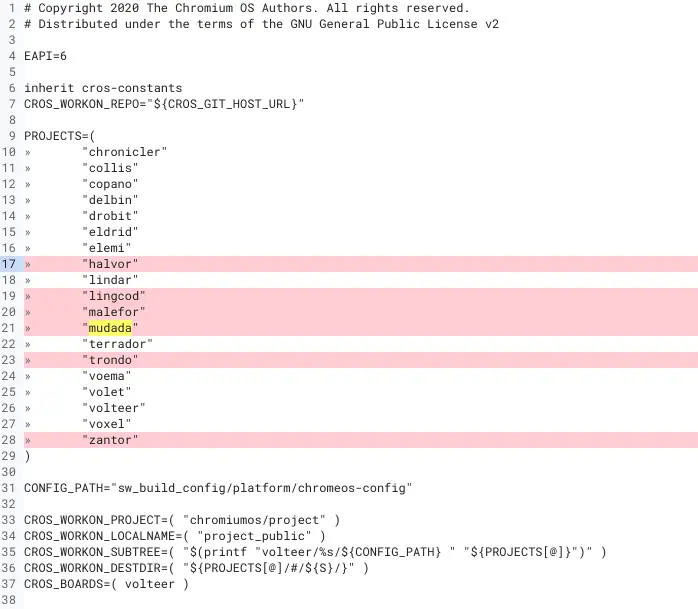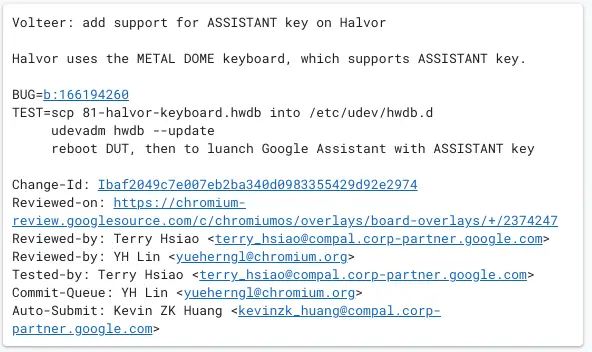First off, let me say I’m not shocked by this revelation. A little sad? Sure, but I’m not surprised at all. As a matter of fact, multiple boards in the ‘Volteer’ family (11th-gen Intel Chromebooks) were killed off in this same move. But losing ‘Halvor’ – the clear beginning of some sort of Google-made Chromebook – stings a little more than I expected. It’s been quite some time since we’ve mentioned ‘Halvor’ and that’s for pretty good reason: the device basically stopped getting any action in the Chromium Repositories. That’s never a good sign and today’s find explains why that is.
Just merged yesterday, this commit is doing exactly what you read up there: removing some ‘Volteer’ boards that won’t be moving forward. To be fair, there are 24 of these boards either in development or out on store shelves at this point. For a single generation of large-core Intel processors, that’s a ton! Especially when you consider the fact that ‘Volteer’ devices are generally in the mid-high price range. These aren’t devices that will likely be bought in bulk for school systems at a deep discount. Instead, these are nicer Chromebooks like the Acer Spin 713 or ASUS CX9 that companies generally don’t make multiple version of for consumers. The highlighted boards in the screenshot below are those already removed and deprecated.
What’s so special about ‘Halvor’?
I suppose a bit of recounting is in order, here. ‘Halvor’ was just another ‘Volteer’ board in the early going, but once we found a very particular commit for this board, we knew right away it would likely be a very different 11th-gen Intel-powered Chromebook. Yes, Chrome OS is Chrome OS is Chrome OS, but Google-made hardware somehow always makes it feel just a bit more special, and ‘Halvor’ had a particular addition that made it clear Google was in the mix from a hardware perspective: the Assistant Key.
Looking back, no other Chromebook gets the Assistant Key outside of Google’s own hardware. There are a few external keyboards out there with the specialized button, but no Chromebook has shipped with it outside of Google’s own stuff. This clear addition made it pretty simple to identify ‘Halvor’ as some sort of Google-y Chromebook and most of us were hoping a Pixelbook 2 might be in the works. It’s no stretch, really, when you look at devices like the excellent ASUS Flip CX5400 and realize these powerful Tiger Lake chips can exist in fanless Chromebooks quite well. The internals in that Chromebook could easily find themselves in a Pixelbook 2.
Alas, Google seems to be all-in on Tensor and the rumors that are currently swirling have the search giant on pace to deliver a Tensor-powered Chromebook at some point in 2023. While I’m plenty excited for that reality to come about, 2023 is a long, long way off in the scope of tech developments. We have the current generation of Chromebooks still rolling out and we’ll be talking about 12th-gen Alder Lake Chromebooks being announced likely in the next couple months. While Google could still put out a Pixelbook of some sort, we can rest assured ‘Halvor’ is no longer in that seat. The highlighted code below has now been removed from the repositories.
What’s next for Google’s Chromebook hardware?
With the Pixelbook Go being the last Chromebook Google made for themselves, it would seem prudent of them to have something in the works at this point, but we’ve found no indication of that so far. For the first time in a long time, it really feels like Google has fully exited the hardware game in the Chromebook market. While I understand the future of Google-made Chromebooks is Tensor, if 2023 is the actual date for that to happen (and if that assumes it is late in the year like previous Pixelbooks), we’re looking at a 4 year gap in Pixelbook brand awareness.
When you’ve had devices as good as the original Pixelbook and Pixelbook Go, why wouldn’t you want to keep the brand in people’s minds? It took a bit of time after the original Pixelbook launched in 2017, but there are a fair share of people that began recognizing the brand as Google’s take on the Chromebook. Chromebook sales are currently doing just fine and the ecosystem is clearly growing. Google doesn’t need to introduce a new device to light the way any longer. Instead, they need to simply update one of their existing devices with more modern internals to keep the flame lit.
Can you imagine Apple or Microsoft not making a new version of their laptops for four years? What sense would that make? If Google is fine with letting the brand cache they managed to build with the Pixelbook name simply fizzle out until some date quite a ways into the future, I suppose that’s their prerogative. But with the great processors and hardware options out there, I can’t understand for a second why they wouldn’t simply update an existing – and already great – piece of hardware just to keep the ball rolling.
I’ve argued for it already, so I wont’ do it again here, but Google really should update either the Pixelbook or Pixelbook go with some fresh internals and re-release. Forget massive exterior overhauls and wild new form factors: just give us a Pixelbook with 11th or 12th-gen processors inside. Just give us something with the Pixelbook name on it to get us to the Tensor times we all know are coming. Four years without a new Pixelbook just seems far too long, and I’m afraid that might just end up being the reality. I sure hope it’s not.
Join Chrome Unboxed Plus
Introducing Chrome Unboxed Plus – our revamped membership community. Join today at just $2 / month to get access to our private Discord, exclusive giveaways, AMAs, an ad-free website, ad-free podcast experience and more.
Plus Monthly
$2/mo. after 7-day free trial
Pay monthly to support our independent coverage and get access to exclusive benefits.
Plus Annual
$20/yr. after 7-day free trial
Pay yearly to support our independent coverage and get access to exclusive benefits.
Our newsletters are also a great way to get connected. Subscribe here!
Click here to learn more and for membership FAQ





